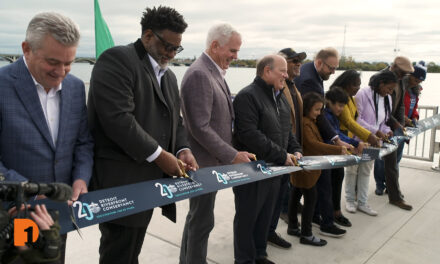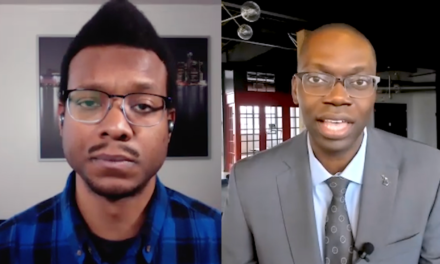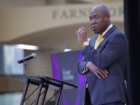Contributor Orlando Bailey of BridgeDetroit has an in-depth conversation with Michigan Lt. Governor Garlin Gilchrist about COVID-19’s impact on the state. They talk about the Governor’s newly-announced “three-week pause” to reduce the spread of the coronavirus, the current data on COVID’s impact on African Americans, and the declaration of racism as a public health crisis. Plus, the Lt. Governor gives his perspective on the controversy surrounding the certification of 2020 election votes in Wayne County.
Read full transcript
Orlando Bailey, Engagement Director, BridgeDetroit Lieutenant Governor Garlin Gilchrist, welcome back to American Black Journal.
Lt. Gov. Garlin Gilchrist, State of MI Thank you for having me, Orlando. Good to be here.
Orlando Bailey, Engagement Director, BridgeDetroit I’m happy to have you. Lt. Governor Gilchrist, there’s a lot to talk about, especially around what’s happening in the state concerning COVID-19. The governor announced Sunday in a rare Sunday evening press conference that we will be pausing as a state to save lives. What exactly does this pause to save lives mean?
Lt. Gov. Garlin Gilchrist, State of MI Well, this is in response to the fact that over the last several weeks we have seen our COVID-19 numbers go from really plateauing and even trending downward to trending upward in communities across the state of Michigan. And this looks a little bit different than it looked in the spring where you saw the most explosive growth happening in Detroit and in southeast Michigan. And instead, this time, while we have seen an increase in the city, in the surrounding areas, we’re seeing really explosive growth throughout the state of Michigan. So this action is following the advice of public health experts. We followed their advice, and we were able to really slow the spread tremendously. And so this action now is we’re taking this three week pause and saying that we need to take a step back because it is important that fewer people are exposed to COVID-19. It is important that fewer people contract it and go to the hospital so that we can have the capacity for our systems to handle an increase in cases. I want less people to die from COVID-19. I know 24 people who died personally, and I don’t want people to continue to get sick and continue to die. And so we have a role to play–all of us. And the public health advice is pretty clear: be careful. Don’t leave your home if you don’t have to. If you do, wear a mask all the time, try to be physically distant, like we can wash your hands. Things like that are really important, but also from an infrastructure perspective, we know that certain types of activities are risky. And what we’ve seen from our data that we released publicly at Michigan.gov/coronavirus is that the virus has been spreading through social gatherings, through small social gatherings, in restaurants and in schools, especially with with elder children, like high school age kids. And so this is following that those recommendations to be careful for these next three weeks. And really, I hope it to be a down payment on us being able to get ahead of this virus while we try to manage it until we have a vaccine or antiviral treatment that is approved, safe and widely available, which is going to take a long time to get there.
Orlando Bailey, Engagement Director, BridgeDetroit Yeah, it’s so important. And this was something that I was particularly worried about simply because we’re now all coming inside. Right? We’ve been outside during the summer and some of the fall and now that it’s getting colder, we’re coming inside and that is particularly risky if we’re not very careful. So the pause is for three weeks. Let me ask you, is there a possibility that the pause could be extended? I remember early on when we were dealing with this, we had executive order after executive order that had time constraints but ended up being extended. We were actually inside for most of the summer. Is there a possibility that this can go on for longer than three weeks?
Lt. Gov. Garlin Gilchrist, State of MI Well, you know, that that that will be responsive to the numbers. If we’re able to see our case rates, the growth of them slow down, which is very possible if people do their best to comply, then we may be able to do this for only three weeks. But there is a possibility that we may need to go longer. But I’m confident actually, I think that people realize, to your point, we’re in a different part of the calendar that’s created some different realities for people as far as what’s possible. We, due to the federal failure on COVID-19, the country, the nation lost a lot of time and a lot of lives. And so we’re trying to act now to try to make this winter less dangerous than it could possibly be. So so we haven’t. So we did this for three weeks. We think that that can get us where we need to go. But if we need to to to go for longer, we will do that following the advice of the health experts.
Orlando Bailey, Engagement Director, BridgeDetroit Let’s talk a little bit about timing. This is happening right before the holiday season. And, of course, there are probably thousands of folks who will be adversely affected economically because of this. What does the conversation with the federal government look like to get people help? We’ve heard the governor say that the state is sort of strapped in terms of offering any additional assistance. Where are we in that conversation?
Lt. Gov. Garlin Gilchrist, State of MI Yeah, it is ongoing. I mean, we have done our best to work with the Trump administration throughout the year. As as folks know, that has been fraught with the president making some very dangerous personal choices about how to engage with the governor personally as well as with the people of the state of Michigan. But we continue to do so working with FEMA and the Department of Homeland Security around getting resources and testing capacity available. We continue to need more of that from the federal government. We also are actively engaged now with the Biden-Harris transition team. The Biden-Harris team, as folks may remember in the election introduced some pretty detailed COVID response plans and have continued to build on those plans and and so we are weighing in and giving input on that. And part of that response needs to be assistance to people, assistance to people who need help, whether that’s extended an easier to get unemployment insurance benefits, revisiting of direct cash payments, support for small businesses, that is actually available to them, especially those who may not have traditional banking relationships, unlike the program was designed, as well as people who need support. We’ve tried to build state programs around eviction diversion, around utility support. So people aren’t getting their utilities cut off, which is going to be important as we go into these winter months. And so we’re continuing to to say that and advocate for federal resources to support these kinds of programs. The state of Michigan’s budget, we were able to to reach an agreement on that this year that didn’t include cuts to education and things like that. But we’re still in a really tough spot. But the federal government has the resources available to give the people of Michigan and the people of America what we need to get through this pandemic. And they need to have the courage to deploy those resources on behalf of the public safety and the economic well-being of all of our people.
Orlando Bailey, Engagement Director, BridgeDetroit I mean, it is urgent. We know the rhetoric that has been and is being cascaded by President Donald Trump is just it has not been helpful. And the deadlock in Congress is really just disappointing because there’s so many people who are disparately affected by this who need help and can’t get it. So good luck with those talks. And I know and I am hopeful that under a Biden-Harris presidency, that conversations with the federal government will get a little bit easier.
Lt. Gov. Garlin Gilchrist, State of MI Well, it certainly will be better that we will have allies rather than adversaries in the White House. And these will also be people who recognize the disparities and this response. You know, Michigan was a leader in terms of actually being directly responsive to the racial disparities that were present in this pandemic. We started initiating our public health infrastructure a month before we had a positive test case, a month and a day after we had our positive test cases we launched the Michigan Coronavirus Task Force on Racial Disparities via executive order. The governor asked me to be the chair and we have led the nation in terms of flattening those disparities. To put this in perspective, in the first two months of the pandemic, black folks, we make up 14 percent, population, 13.6. We accounted for 38% of the infections and 41% of the deaths. Horrific, catastrophic. And so we got to work and doing immediate interventions, making millions of masks available for free, standing up neighborhood testing sites, pop up testing, drive through testing, isolation, infrastructure, working with local racial disparities, efforts, getting people connected to doctors and health insurance, all sorts of things. And that has led to us really fighting those disparities. Now, black folks over the last two months, have accounted for less than 10 % of the deaths and less than 8% of the infections. So we can make progress when we focus. And the Biden-Harris administration, Senator Harris, had legislation to replicate our racial disparities task force at the federal level. We know that that this can work if we put our attention toward it to protect vulnerable people. And I’m particularly concerned about that as we move into these winter months with growing cases that we hold on that progress because it has strengthened our overall state response and we need to continue to help that be true.
Orlando Bailey, Engagement Director, BridgeDetroit Speaking of task forces and councils and things like that, you and the governor announced last week your appointees for the Michigan Black Leadership Advisory Council, a 20 person council, five five of those appointees are Detroiters. Tell us about the areas that the council will be looking at and how deep in the weeds are they going to get and what’s the connection to the racial disparities task force?
Lt. Gov. Garlin Gilchrist, State of MI Yeah, so first of all, this is a council that exists alongside other racial and ethnic commissions inside of state government, but the black community, black Michiganders are the largest racial and ethnic minority actually in Michigan, but was the group that did not have a council representation in state government. So we have remedied that challenge. And this is a holistic group. You can see that we have people from all walks of life who are represented in this task force and also from all areas of our state. And what that should indicate to people is that every element of black life in Michigan will be on the table for this commission to consider, to understand and to make recommendations on a policy program and practices perspective about how to improve it. Let me note that the direct issue or this direct idea was presented during one of our community engagement exercises as an administration. I led a tour called ‘Thriving Cities,’ that went to 19 cities across state of Michigan, starting in Detroit in August of last year. And it was at the meeting in Muskegon, where this directly was mentioned as something that will be important to do as a state, to lift up the voices of black leaders and to have them have a seat at the table of decision making in policymaking in the state of Michigan. And this is us being directly responsive to that call to action. And so I would expect this group to work on issues related to economic opportunity to reforming our system or providing more environmental justice in our system, equitable access to education, building on the progress that we’ve made, investing in how we can reduce and eliminate, eradicate poverty, supporting and expanding our efforts to reform our criminal legal system. Really, everything is on the table. And so I would not see this as just a group that’s going to be focused on one issue area, but a group that will be focusing on the entire black experience in Michigan. I’m very excited about that and excited about the leadership, the leaders who have stepped up to be part of it.
Orlando Bailey, Engagement Director, BridgeDetroit Yeah, I’m excited about it, too. And some of the issues that you named, where we where the state will be working to achieve equity, you know, there is an equity imbalance. And most of that equity imbalance I would attribute to the fabric of racism that permeates throughout this country was the country’s original sin. Is Michigan moving toward just adopting an anti-racism platform? We’ve heard the governor say that racism is a public health hazard. What what sorts of outcomes are we looking for in these subcommittees of education, health, community safety and business leadership?
Lt. Gov. Garlin Gilchrist, State of MI Yeah, this is all part of that, so the declaration of racism as a public health crisis was an executive directive that we enacted. That was a direct recommendation from the Racial Disparities Task Force. The Coronavirus Racial Disparities Task Force. And the reason that that is important is because that directive actually unlocks all of the tools of state government to be self-reflective, to look at the again, the programs, the policy, the practices and say, what have we done, what have we made, what have we enacted? How has historic systemic prejudice and racism played into the choices that have been made in the system that have been designed? And then what can we do to remove the injustice from those systems? How can they be reformed or upgraded or updated or replaced? Whatever needs to happen to create something that is that is not racist and that is actually just and creates opportunity and space for people to be their best selves, regardless of their identity, where they live, et cetera.
It is a recognition that that racism has played a role in outcomes previously and that we can be the administration that seeks to change the trajectory of the state of Michigan and our people on that behalf. So we’re going to build on things that we’ve done. We have introduced the most equitable education funding regime since education funding was changed in the mid ’90s with the two budgets that we passed. We’re one of the only states that actually did not cut education funding in the budget that we passed in 2020. I think that’s really important as the needs are so deep. But we also are going to be looking at how do we create opportunity for black entrepreneurs who have ideas and how can they have the supports, the access to capital, the access to to contracting opportunities and things like that. These are these are things that we’re going to look at and be responsive to. So I think that this is really about how and what the measures to look at is what are we doing to create space and opportunity? I believe that my responsibility as a public servant is to protect and promote public health, public safety, and to create the conditions for everyone in our state to pursue their happiness and have a chance to success. That’s going to look different for different people. But that is what we are here to do and how we are here to serve. And so I’m looking forward to this council playing an important role in that for black Michiganders and supporting, frankly, the fact that if black Michiganders are successful, it makes the state of Michigan more successful, just like with the racial disparities, task force of the communities of color are able to navigate and have resilience in the face of any public health challenge. It makes the state of Michigan better able to navigate any public health crisis. And so that’s really where we’re coming from. And that is how equity is. It’s part of how we make choices as an administration. And I’m proud to serve alongside Gretchen Whitmer to do that.
Orlando Bailey, Engagement Director, BridgeDetroit I’m excited about it. I can’t wait to check in with you as the council begins to meet. Lastly, I just want to get your reaction, if I may, to some more breaking news in Wayne County, where GOP members of the board of canvassers wrote an affidavit submitted last night that they want to rescind their votes that certified the election results in the county. You’re a resident of Wayne County. I am a resident of Wayne County. How are you feeling about all this?
Lt. Gov. Garlin Gilchrist, State of MI It is insulting, disgusting. It is clearly driven by race. You had the the commissioner, the chair of the commission, who literally said that she would be comfortable certifying every place except Detroit, even though Detroit did not have the most irregularities. Livonia did. I mean, I think it speaks to the fact that she said that she got a call from the president and the president’s team before submitting this this affidavit to try to rescind their vote. But what I’m most proud of in this story, to be clear, is that when these Republicans came for the votes of Detroiters, Detroiters stood up and stood tall and spoke out and said that this will not be tolerated. This will not happen. You will not stand between us and our democracy. And this is it reminds me of the adage that, you know, that I espouse as a community organizer before I became an elected official is that the people united will never be defeated. And I saw that in Wayne County. I saw that with the public uprising for hours that got those Republican canvassers to step out of their partisan racist boxes and change their vote to certify this election. And I expect the state board of canvassers to now do their job and do the same. And so I think that what happened was a miscarriage of justice that the people corrected. And I would hope that that continues to carry the day forward. And the lack of courage shown by these Republican commissioners now wanting to essentially call for a take back of their vote just shows why they cannot be trusted with our democracy. Republicans have demonstrated time and time again that they are ill -equipped to be trusted with our democracy. But the people can and always should be trusted with our democracy.
Orlando Bailey, Engagement Director, BridgeDetroit The people are the keepers of the democracy. Garlin Gilchrist, Lt. Governor for the state of Michigan, thank you. Joining us,.
Lt. Gov. Garlin Gilchrist, State of MI Orlando, thank you for having me.








